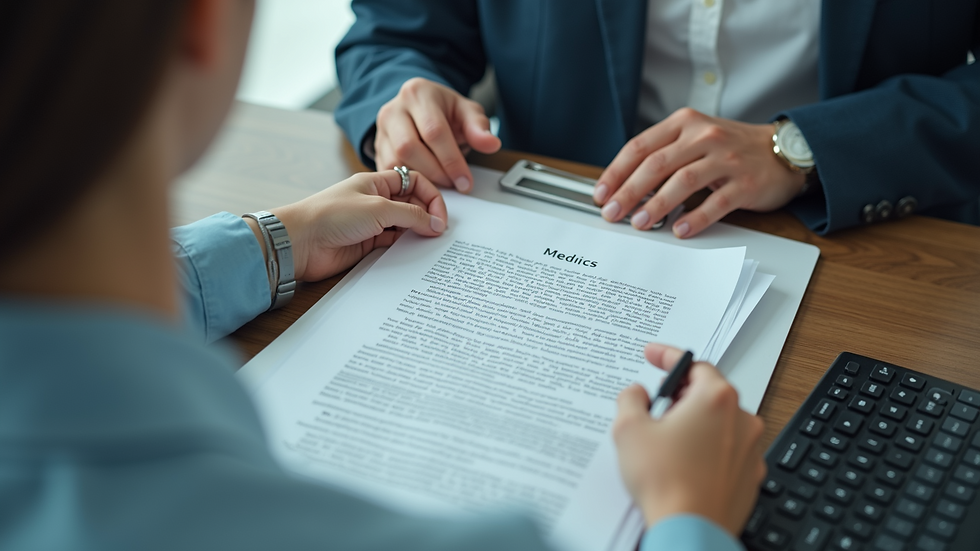Understanding Document Attestation for UAE Applications
- mofa attestation service
- Aug 27
- 4 min read
When applying for various official purposes in the UAE, one crucial step is ensuring your documents are legally recognized. This process is known as document attestation. It verifies the authenticity of your documents, making them valid for use in the UAE. Whether you are applying for a job, residency, education, or business setup, understanding how document attestation works can save you time and avoid unnecessary complications.
What is UAE Document Attestation?
UAE document attestation is the official process of certifying documents issued in one country so they are accepted as genuine in the UAE. This involves multiple levels of verification by government authorities. The goal is to confirm that the document is authentic and issued by a legitimate source.
Documents that often require attestation include:
Educational certificates (degrees, diplomas)
Birth and marriage certificates
Commercial documents (contracts, invoices)
Power of attorney and legal affidavits
The attestation process typically involves verification by the issuing country’s Ministry of Foreign Affairs, followed by the UAE Embassy or Consulate in that country, and finally the UAE Ministry of Foreign Affairs and International Cooperation.

This multi-step verification ensures that the UAE authorities can trust the documents submitted for various applications. Without proper attestation, your documents may be rejected, causing delays or denial of your application.
Why is UAE Document Attestation Important?
Understanding the importance of UAE document attestation helps clarify why it is mandatory for many applications. The UAE government requires attested documents to:
Prevent fraud: Attestation confirms the document’s authenticity, reducing the risk of forged or fake papers.
Ensure legal compliance: It aligns with international agreements and UAE laws regarding document verification.
Facilitate smooth processing: Attested documents speed up application approvals for visas, jobs, education, and business licenses.
Maintain trust: It builds confidence between the UAE authorities and applicants by verifying the legitimacy of submitted documents.
For example, if you are applying for a work visa, your educational certificates must be attested to prove your qualifications. Similarly, if you want to start a business, commercial documents need attestation to validate your company’s legal status.

Failing to provide attested documents can lead to application rejection or requests for resubmission, which can be costly and time-consuming. Therefore, understanding the attestation requirements for your specific application is essential.
How do I get documents attested?
The process of getting your documents attested for UAE applications involves several clear steps. Here is a practical guide to help you navigate this procedure:
Prepare your documents
Ensure your documents are original and complete. For educational certificates, get them from the issuing institution. For personal documents like birth certificates, obtain them from the relevant government office.
Notarization (if required)
Some documents may need notarization by a local notary public before attestation. This step confirms the document’s authenticity at the local level.
Attestation by the issuing country’s Ministry of Foreign Affairs
Submit your documents to the Ministry of Foreign Affairs or equivalent authority in the country where the documents were issued. They will verify and stamp the documents.
Attestation by the UAE Embassy or Consulate
After the home country’s attestation, the documents must be attested by the UAE Embassy or Consulate in that country. This step confirms the UAE’s acceptance of the document.
Final attestation by the UAE Ministry of Foreign Affairs and International Cooperation
Once the documents arrive in the UAE, the last attestation is done by the UAE Ministry of Foreign Affairs. This final stamp validates the documents for official use in the UAE.
Additional attestation (if applicable)
Some documents may require attestation by local authorities such as the Department of Economic Development or the Ministry of Education, depending on the document type and purpose.

Tips for a smooth attestation process:
Check the specific attestation requirements for your document type.
Use professional attestation services if you are unfamiliar with the process.
Keep copies of all documents and attestation stamps.
Start the process well in advance of your application deadline.
For more detailed information and official guidelines, you can visit the docuemnt attestation portal.
Common Challenges and How to Avoid Them
Many applicants face challenges during the attestation process. Being aware of these issues can help you avoid delays and complications.
Incomplete documents: Missing signatures, seals, or incorrect information can cause rejection. Double-check your documents before submission.
Wrong attestation sequence: Attestation must follow the correct order - home country, UAE Embassy, then UAE Ministry. Skipping steps leads to invalidation.
Expired documents: Some documents have validity periods. Ensure your documents are current and not expired.
Language barriers: Documents not in Arabic or English may require certified translation before attestation.
Fake attestation services: Use only authorized attestation centers or government portals to avoid fraud.
How to avoid these problems:
Consult official UAE government websites or trusted service providers.
Prepare all documents carefully and verify their completeness.
Follow the attestation steps precisely.
Allow sufficient time for processing, especially if documents need to be sent internationally.
Practical Uses of Attested Documents in the UAE
Once your documents are attested, they can be used for various official purposes in the UAE. Here are some common scenarios:
Employment: Attested educational and professional certificates are required for work permits and visa applications.
Education: Students applying to UAE universities must submit attested academic transcripts and certificates.
Residency and visa applications: Personal documents like birth and marriage certificates need attestation for family visas and residency permits.
Business setup: Commercial documents such as contracts, licenses, and power of attorney require attestation for company registration.
Legal matters: Attested affidavits and legal documents are necessary for court cases, property transactions, and other official procedures.
Understanding these uses helps you prepare the right documents for attestation based on your specific needs.
By following the correct procedures and understanding the importance of UAE document attestation, you can ensure your applications proceed smoothly and efficiently. Properly attested documents are your key to unlocking opportunities and legal recognition in the UAE.
Comments